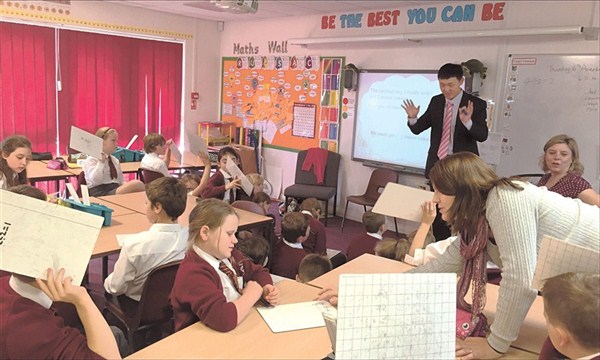
今日上海
上海教师受邀赴英授课交流 - 2015年03月06日
City teacher showing UK students how it all adds up

SHANGHAI attracted world attention when the 2012 results of the PISA survey of 510,000 students in 65 countries ranked the city No. 1 in mathematics competency. Britain ranked 26.
The influential test, conducted every three years by the Organization for Economic Cooperation and Development, left UK educators scratching their heads about how to climb those 25 steps.
Feng Yicheng, 29, a math teacher at the Shanghai Experimental School, has a few ideas on that subject. He was one of 29 math teachers from city primary schools invited to the UK last November to teach British children arithmetic. The exchange program was so successful that he will accompany a second group to Britain later this month.
“This program is attractive as we stay in one school for a month and become involved with teachers and students on a daily basis,” Feng told Shanghai Daily.
“It enables me to examine the advantages and disadvantages of Chinese and British math teaching methods.”
And differences there were when Feng found himself in front of fifth and sixth graders at Newick Church of England Primary School and South Malling Church of England Primary School in East Sussex, last November.
He was surprised, for example, to discover that British students didn’t know what “denominators” and “numerators” were. They referred to the two parts of a fraction as the “bottom number” and “top number,” without understanding their relationship, Feng said.
Talking to teachers, Feng discovered that the British education system doesn’t dwell on concepts, which are regarded as fundamental in the Chinese system.
“Concepts are illustrated and arranged in proper sequence in textbooks so that students progressively learn more complicated knowledge. Each concept feeds into later studies,” he said.
“But in Newick, students don’t have textbooks at all. Teachers just pick things they believe will be useful from different textbooks and design their own class work, which might lack logical arrangement,” according to Feng.
In Shanghai, a class in primary schools lasts 35 minutes; in the UK, one hour. Feng had to rearrange his teaching methods because he found that British pupils get restless easily and don’t sit quietly through an hour of instruction.
“So I divided each lesson into four parts,” Feng said. “I would spend 15 minutes on illustrating some bit of knowledge and then ask students to practice for the next 15 minutes.”
Feng has taught math for seven years at the Shanghai Experimental School. He was chosen for the Shanghai-UK exchange program after an interview with the Shanghai Educational Commission. During the 2014 summer school break, he participated in a training program dealing with the curriculum and math-teaching methods in UK primary schools. He also talked with a group of British math teachers who visited Shanghai that summer.
To get British students thinking about arithmetic systems, Feng would hand out four poker cards to each student and ask them to configure sequences that led to 24 in addition and multiplication. The British students, he said, were fascinated by his “game of 24 points.”
Feng said the classes he taught in Britain contained students at varying degrees of competency. Some badly lagged their classmates.
He attributed the disparity to a lack of a unified teaching system.
“In China, we have precisely designed textbooks and syllabus to ensure that most students learn at the same level at the same time,” he said. “Students may vary in their understanding and applications of those principles, but the gap would not be so large as to prevent slow learners from catching up.”
Feng said his teaching methods were viewed with some skepticism by British teachers, but in the end, some asked him to explain his concepts.
It wasn’t all a one-way street. Feng said he learned from the experience. He was deeply impressed by the classroom environment. Unlike classrooms in Shanghai, where desks and chairs are meticulously arranged, the British classrooms had desks and chairs randomly placed and walls filled with student works.
“Putting students’ homework on the wall not only makes them more confident about their own performance,” he said, “but it also reminds them of what they have learned previously.”
The British school, he noted with admiration, also focuses on cultivating individual responsibilities beyond academic skills. Students are taught about library management and looking after younger children, he said. And student monitors are tasked with silencing classmates after the bell rings for class.
“They even have students to help guide visitors,” Feng said. “I was surprised to see students proficient in helping visitors sign the entry register.”
Feng will help accompany a group of 30 math teachers from Shanghai to the UK on February 22, three days after the start of the Chinese New Year.
“The trip shortens my family reunion,” he said, “but that’s a small sacrifice. I can see opportunities to share my skills and learn ways to improve my teaching.”

